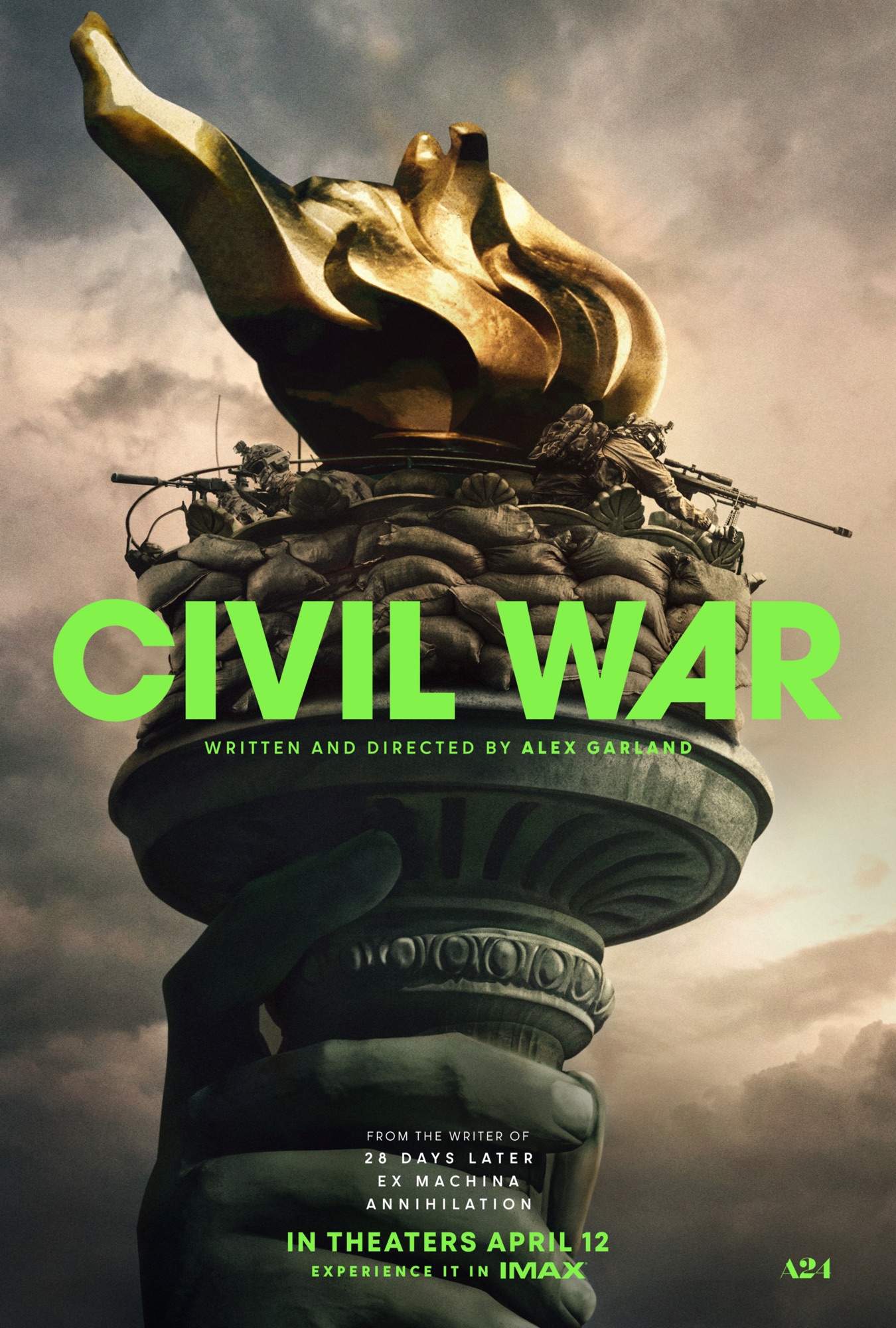When I was in community college I took some journalism classes and wanted to be a reporter for the local newspapers. In those classes I learned about being open minded and how important it was for my voice to not take any sides. My job as a writer would be to give the facts and let the reader decide what they would take from my writing. Alex Garland’s Civil War does just that. It presents us with a scary look into the future as we follow a group of military-embedded journalists who are trying to get to DC before its eventual invasion.

The movie follows Lee and Joel, Played by Kirsten Dunst and Wagner Moura, as they are planning to try to interview the President in DC before the inevitable invasion occurs. During a stop in a local city Lee meets Jessie, played by Cailee Spaeny. Jessie idolizes Lee and wants to be a war photographer like her. During the evening in a local hotel Lee and Joel are talking to their colleague, Sammy, played by Stephen McKinley Henderson, and inform him of their plan to get to DC. Sammy asks for a ride to Charolotteville in exchange for not telling others about their plan. The next morning we see Jessie in their truck, due to her sharing drinks with Joel at the bar and he thinks it would be a good way for her to learn about what they do.
Now with this information this sounds like it will be a typical road trip movie but it is more atypical than typical. The crew have to drive through active military areas and keep their head on a swivel whenever they walk anywhere. The movie really keeps the tension going as we do not know what is around the next corner or who can be trusted. We get little pieces of information as to how the country got here: the President is on their third term. California and Texas have formed an alliance (I know that it is hard to believe) to take down the President, and there are little pockets of the country that are trying to go on as if nothing is happening.

One thing that might seem cruel to the audience is how emotionless the journalists are to the atrocities around them. They have seen so much death and destruction that seeing someone shot in front of them is just another photo to be taken. These people are there to chronicle the story and show it to the world. They are there to give the world a warning of what is to come and what is happening around the world but sadly the message goes unheard. At one point Lee says “Everytime I survived a war-zone, I thought I was sending a message home but here we are.”
WIth that said we do see the development of timidness to excitement of taking these pictures through the character of Jessie. When we first meet her she is green and knows a few things about taking these types of pictures. Jessie is a great complement to the hard and grizzled Lee whose hard shell is slowly cracked by Jessie. The teacher and apprentice aspect of their story is touched upon here and there and brings a lightness to this heavy movie.
As hard to watch the movie is at times there are some interesting needle drops played at certain times. De La Soul’s “Say No Go” is played after an intense gunfight and might have you scratching your head as to why it comes on. The subject of the song matter is “drug addiction” and the following images of the joy the participants in the gun battle are having corresponds to a new type of addiction that is forming because of this war. This song and other songs are not just played for shock value.

The third act is when we see a big shift in the pacing. The action really intensifies and we see the journalist tested with everything that is going around them. Again, their role there is to help tell the story and the story they are chronicling is one that seems like it can happen. Civil War is a cautionary tale that might foreshadow real world events. This movie will be talked about for years to come due to its unflinching look at war and the lives of military-embedded journalists.
Final Thoughts: CIvil War shows us the brutality of war and the dangers journalists put themselves in to get the story out to the public. The movie displays images of horror that will stay with you long after it is done. While many will be looking for a message or a meaning to this movie, like journalism, Civil War stays in the middle and lets us decide what to take from the movie. CIvil War is unflinching and unnerving and will be talked about for years to come.
Kid-Friendly: The movie deals with war and is more suitable for older kids. This can spark some great conversations about why journalists do what they do and also about why they put themselves in these situations.
Violence: There are a few moments in this movie where I had to look away from the screen. THe horrors are not hidden and are right in your face. Being that this is an R-rated movie there are plenty of bad words, scenes of the aftermath of gun fights, and use of recreational drugs.
A journey across a dystopian future America, following a team of military-embedded journalists as they race against time to reach DC before rebel factions descend upon the White House.
